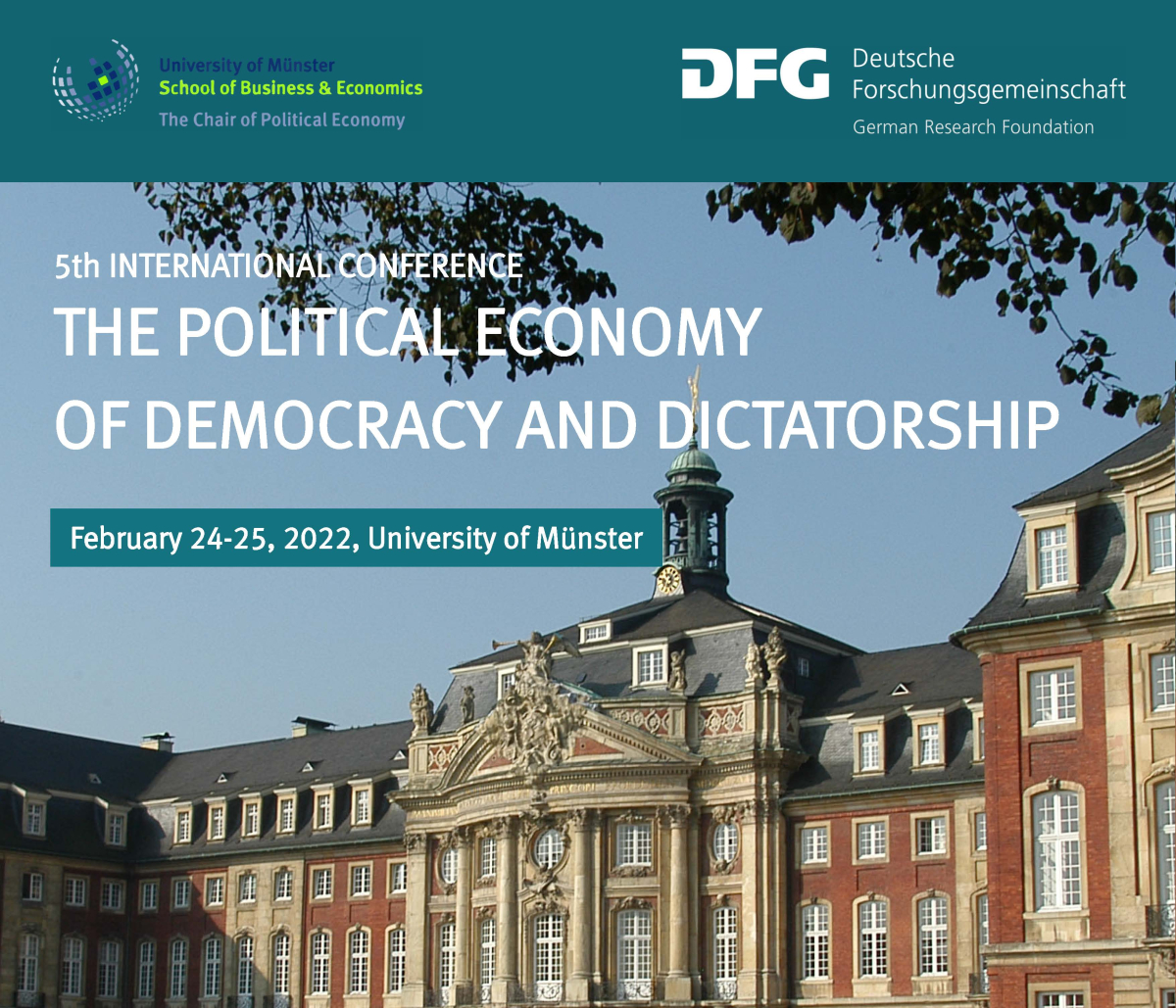PEDD 2022
 From 24 to 25 February 2022, the Chair of Political hosted the fifth international conference on "The Political Economy of Democracy and Dictatorship" (PEDD). Originally planned as a presence-based conference, the two-day conference was held on short notice as an online conference in response to developments in the pandemic. During the two-day event, about 50 researchers from 15 nations presented their current research projects. The conference program, selected by the scientific committee through a submission-and-reviewing process, covered a wide range of scientific issues at the interface between economics and political science: The topics ranged from institutional and political stability in democracies and autocracies, populism and general electoral behavior, to transition processes in political systems and political conflicts.
From 24 to 25 February 2022, the Chair of Political hosted the fifth international conference on "The Political Economy of Democracy and Dictatorship" (PEDD). Originally planned as a presence-based conference, the two-day conference was held on short notice as an online conference in response to developments in the pandemic. During the two-day event, about 50 researchers from 15 nations presented their current research projects. The conference program, selected by the scientific committee through a submission-and-reviewing process, covered a wide range of scientific issues at the interface between economics and political science: The topics ranged from institutional and political stability in democracies and autocracies, populism and general electoral behavior, to transition processes in political systems and political conflicts.
As in previous years, two internationally renowned researchers from the field of Political Economy were invited to give keynote speeches at this year's conference. Prof. Dr. Monica Martinez-Bravo from the CEMFI (Spain) spoke on the topic "Trust and accountability in times of the pandemic". Prof. Dr. Monica Martinez-Bravo presented an on-going research project in which she is investigating the political trust of Spanish citizens in response to local COVID policies. Her research indicates substantive and potentially permanent effects of individual perceptions of the effectiveness of COVID policies on citizens' political satisfaction. The keynote lecture by Prof. Martinez-Bravo provided important methodological and substantive implications for a scientific examination of these effects. The experimental design of the study attracted particular interest by the audience and encouraged further discussions and applications in other political contexts.
In a second keynote speech, Josiah Ober from Stanford University (USA) addressed the topic "Can (ancient Greek) democracy be rational? If so, how?". Prof. Ober's impressive body of work moves at the interface of historical science, political science and empirical social research and thus corresponds ideally to the interdisciplinary orientation of the PEDD conference. In his lecture, Prof. Ober spoke about the connection between ancient ideas of political and social philosophy, especially in Socrates and Plato, and the rational choice concept of modern social sciences. The audience was very interested in this extraordinary perspective on democratic processes. After the lecture, they continued their digital exchange with Prof. Ober.
As in previous years, a Special Session on "The Political Economy of Europe" was organized in collaboration with the Center for European Studies (CefES-DMES) of the Bicocca University of Milan. This session addressed researchers working on current political, economic or social issues in Europe and the European Union. The papers selected for this session addressed determinants of European citizens' voting behavior and discussed, among other things, what influence EU funding measures or current debates at election times have on individuals' political behavior.
In order to further emphasize and reward the importance of the contributions by young scientists, the PEDD Young Scholar Award was introduced at this year’s conference. The prize is awarded to the best research paper of a junior scientist under 35 years of age and it is endowed with a monetary award of 500€. This year, the PEDD Young Scholar Award war awarded to Leonardo D'Amico from Harvard University. His winning entry explores the highly relevant research question of how European Union funding is actually used for economic development in the regions. The jury emphasized the high quality of all contributions considered for the award and highlighted the substantial contribution of young scholars to the overall quality of the PEDD conference.
In addition to the scientific aspects, the focus was also on the personal exchange between the participants. With the experience gained from the online event in 2020, technical difficulties could be avoided and a smooth digital take-off could be guaranteed. Thus, this year's PEDD conference was able to reach even more researchers worldwide and further expand the network.
Unfortunately, the first day of the PEDD 2022 conference was overshadowed by Russia's invasion of Ukraine, which began the night before. Frighteningly, it showed that the need for research on conflict, political regimes, and political influence is far from exhausted. The presented research on the ongoing pandemic and its political impact also provided a first-hand insight into an ongoing field of academic and societal concern. These highly relevant social, economic and political issues will continue to be at the heart of upcoming PEDD conferences.
Date and Location
24 to 25 February, 2022
University of Münster, Germany (virtual conference)
Scientific Board
Thomas Apolte, University of Münster, Germany
Mario Ferrero, University of Eastern Piedmont, Italy
Mario Gilli, Bicocca University Milan, Italy
Yuan Li, IN-EAST Institute for East-Asian Studies, Germany


